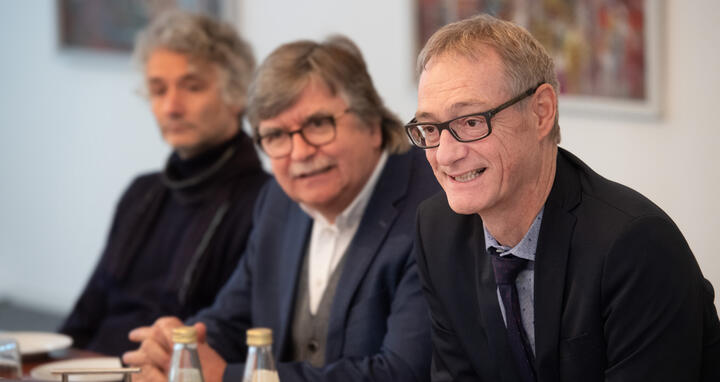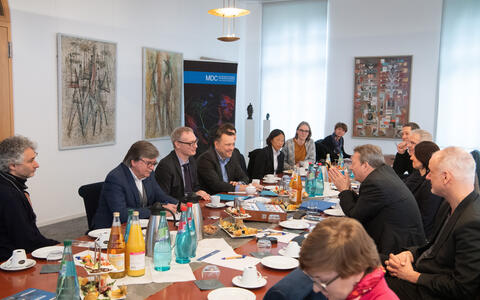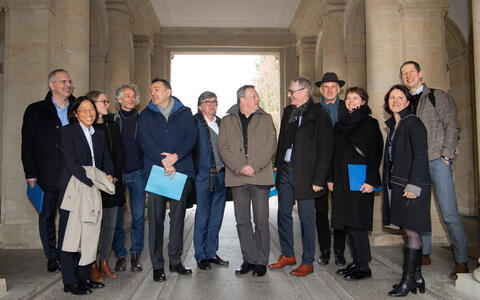State Secretary Christian Luft visits the MDC
The exchange in the Jeanne Mammen Hall was cordial and the program was multifaceted. During a nearly three-hour visit to the Max Delbrück Center for Molecular Medicine in the Helmholtz Association (MDC) in Berlin-Buch, State Secretary Christian Luft from the Federal Ministry of Education and Research (BMBF) gained information about the current progress of basic research in molecular medicine and the MDC’s strategy. During his visit, he held in-depth discussions with the MDC Board of Directors and six MDC scientists. Christian Luft was accompanied by Ministerial Counsellor Jan Grapentin, Assistant Secretary Thomas Romes and Dr. Jill Theuring, all from the BMBF.
Christian Luft (dritter von links), State Secretary in the Federal Ministry of Education and Research (BMBF), informed himself about current advances in basic research in molecular medicine and the new strategy of the MDC.
“We are proud that the MDC exists and have great appreciation for what you are doing,” Luft said at the start of his visit, adding: “The goal of the Federal Ministry of Education and Research, as well as the MDC research groups, is to promote and conduct outstanding, internationally recognized and well-networked basic research. But we also need translation and good links between science and industry. We need to find a good balance here.”
It was precisely this combination of internationally networked basic research, high-tech and translation that the MDC presented to the BMBF delegation through three main topics: single-cell biology, cardiovascular research (in partnership with the DZHK and the BIH) and translational research (in partnership with Charité – Universitätsmedizin Berlin in the Experimental and Clinical Research Center, ECRC).
Berlin as hub for biomedicine
Dr. Henrike Maatz and Professor Nikolaus Rajewsky informed the guests about the gigantic leap that single-cell biology has made in systems medicine, such as in understanding heart diseases – and, above all, in general approaches to tracing disease processes from the earliest possible point and, looking to the future, even influencing them before they arise. Rajewsky presented plans for establishing a “Berlin Cell Hospital” together with other Berlin partner institutions, enabling a direct bridge to be built between new methods and disease research and treatment. Rajewsky highlighted the international networking of single-cell biology at the MDC in the LifeTime consortium. Professor Thomas Sommer, interim Scientific Director of the MDC, stressed the major opportunity to find new points of cooperation in this field, including with industry. “Germany was once the pharmacy of the world,” Sommer said. “These approaches will allow us to once again create closer ties with the pharmaceutical industry. We need centers and we need hubs, and Berlin is one such hub. This influence could radiate throughout Germany.”
From left to right: Professor Norbert Hübner, MDC, Professor Young-Ae Lee, MDC, Dr. Henrike Maatz, MDC, Professor Dominik N. Müller, MDC, Thomas Romes, Federal Ministry of Education and Research, Dr. Jan Grapentin, Federal Ministry of Education and Research, Professor Thomas Sommer, MDC, State Secretary Christian Luft, Federal Ministry of Education and Research, Prof. Nikolaus Rajewsky, MDC, Jill Theuring, Federal Ministry of Education and Research, Prof. Heike Grassmann, MDC, Prof. Holger Gerhardt, MDC.
Vascular medicine research cluster
Professors Norbert Hübner and Holger Gerhardt outlined the new systems medicine approaches in cardiovascular research and the study of vascular diseases that they are pursuing at the MDC with their colleagues. Both experts outlined the MDC’s regional, national and international networking efforts. Hübner presented the MDC’s new research strategy for the coming years under the title “Systems Medicine and Cardiovascular Diseases.”
Gerhardt is investigating the development and prevention of vascular diseases and therapeutic approaches to them. He emphasized that such systems research must be deepened and promoted even more strongly. A translational, interdisciplinary approach is indispensable. “We want to work together with clinicians in a targeted, interlinked way so that issues are transferred from the clinic directly into research and from there directly back to the clinic,” Gerhardt said. “The Berlin Institute of Health (BIH), which is constructing the Käthe Beutler Building for Vascular Medicine on the Buch campus, is important in this respect. It means that an outstanding research cluster for translational vascular biomedicine is emerging in Berlin.”
In presenting their latest research results, Dominik N. Müller and Young-Ae Lee demonstrated how strongly translation is anchored in the MDC’s mission. Both MDC professors work at the Experimental and Clinical Research Center (ECRC). Lee, a genetic researcher and pediatrician, heads an outpatient clinic there and investigates the development of allergies and chronic inflammation. Müller investigates how our diet can influence high blood pressure and other diseases, for example, in studies with human subjects. Currently, he is researching the effects and consequences of high salt consumption on the gut microbiome. Researchers at the ECRC also work with patient data collected in a metabolic chamber. Christian Luft’s visit ended with a tour of the chamber.






